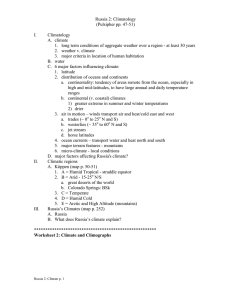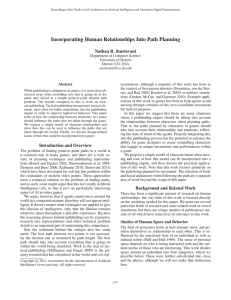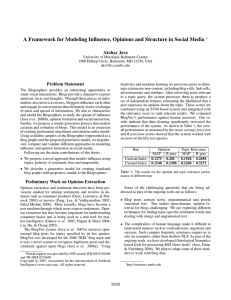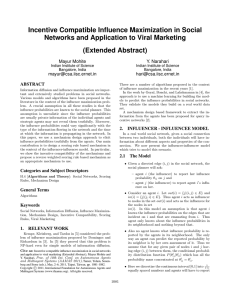Overview 1 Trends in the International Community
advertisement
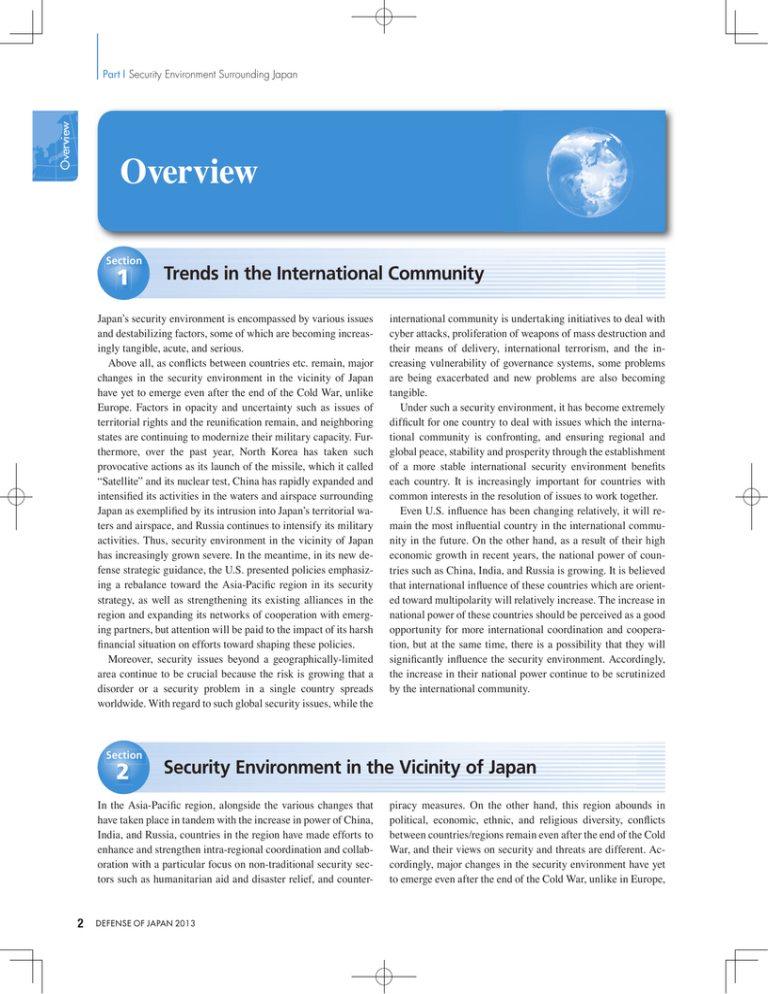
Overview Part I Security Environment Surrounding Japan Overview Section 1 Trends in the International Community Japan’s security environment is encompassed by various issues and destabilizing factors, some of which are becoming increasingly tangible, acute, and serious. Above all, as conflicts between countries etc. remain, major changes in the security environment in the vicinity of Japan have yet to emerge even after the end of the Cold War, unlike Europe. Factors in opacity and uncertainty such as issues of territorial rights and the reunification remain, and neighboring states are continuing to modernize their military capacity. Furthermore, over the past year, North Korea has taken such provocative actions as its launch of the missile, which it called “Satellite” and its nuclear test, China has rapidly expanded and intensified its activities in the waters and airspace surrounding Japan as exemplified by its intrusion into Japan’s territorial waters and airspace, and Russia continues to intensify its military activities. Thus, security environment in the vicinity of Japan has increasingly grown severe. In the meantime, in its new defense strategic guidance, the U.S. presented policies emphasizing a rebalance toward the Asia-Pacific region in its security strategy, as well as strengthening its existing alliances in the region and expanding its networks of cooperation with emerging partners, but attention will be paid to the impact of its harsh financial situation on efforts toward shaping these policies. Moreover, security issues beyond a geographically-limited area continue to be crucial because the risk is growing that a disorder or a security problem in a single country spreads worldwide. With regard to such global security issues, while the Section 2 Security Environment in the Vicinity of Japan In the Asia-Pacific region, alongside the various changes that have taken place in tandem with the increase in power of China, India, and Russia, countries in the region have made efforts to enhance and strengthen intra-regional coordination and collaboration with a particular focus on non-traditional security sectors such as humanitarian aid and disaster relief, and counter- 2 international community is undertaking initiatives to deal with cyber attacks, proliferation of weapons of mass destruction and their means of delivery, international terrorism, and the increasing vulnerability of governance systems, some problems are being exacerbated and new problems are also becoming tangible. Under such a security environment, it has become extremely difficult for one country to deal with issues which the international community is confronting, and ensuring regional and global peace, stability and prosperity through the establishment of a more stable international security environment benefits each country. It is increasingly important for countries with common interests in the resolution of issues to work together. Even U.S. influence has been changing relatively, it will remain the most influential country in the international community in the future. On the other hand, as a result of their high economic growth in recent years, the national power of countries such as China, India, and Russia is growing. It is believed that international influence of these countries which are oriented toward multipolarity will relatively increase. The increase in national power of these countries should be perceived as a good opportunity for more international coordination and cooperation, but at the same time, there is a possibility that they will significantly influence the security environment. Accordingly, the increase in their national power continue to be scrutinized by the international community. DEFENSE OF JAPAN 2013 piracy measures. On the other hand, this region abounds in political, economic, ethnic, and religious diversity, conflicts between countries/regions remain even after the end of the Cold War, and their views on security and threats are different. Accordingly, major changes in the security environment have yet to emerge even after the end of the Cold War, unlike in Europe,





